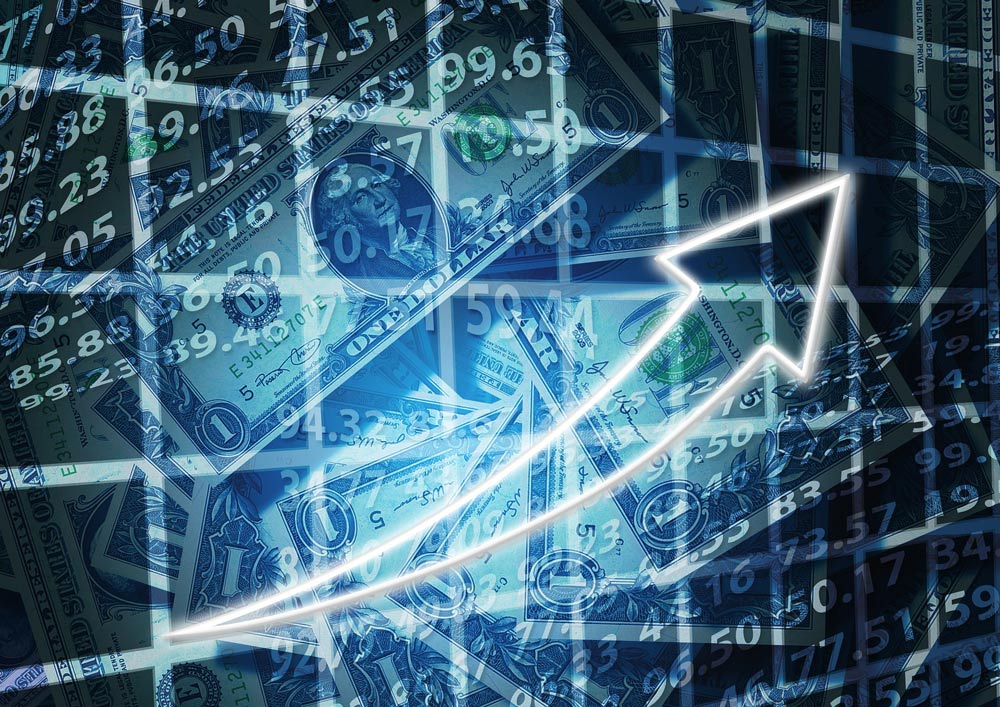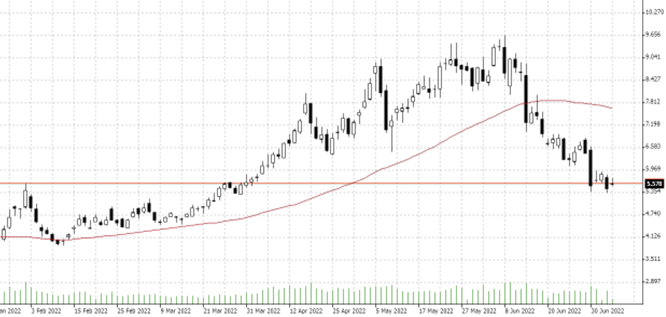

06.07.2022 – Is this the end of the buying frenzy for natural gas? The market seems to have become accustomed to the tense situation – it almost looks as if all the negative factors have been priced in. Yet the risks of a new gas panic have by no means been eliminated.
Traders and investors are surprisingly hardened when it comes to natural gas. First the Ukraine invasion. Then, about a month ago, an explosion at the Freeport Quintana liquefied natural gas terminal in Texas. And for weeks now, the price has been falling sharply again. The picture shows the daily chart with the 50 moving average. Obviously, the market is betting on the replacement of Russian gas, for example from Arabia, or on a normalization of the geopolitical situation.

Source: Bernstein Bank GmbH
In addition, just news from Norway contributed to the cooling. As recently as Sunday, the industry had warned that a strike by oil and gas workers could reduce production by 292,000 barrels of oil equivalent per day, or about 13 percent of total output. However, the Norwegian government has now ended the walkout after a few hours. But the issue could flare up again. Norway, by the way, will not be able to supply more gas until 2024 at the earliest.
Gazprom punishes the West
This brings us to Russia. Moscow is already using gas as a weapon: Since mid-June, only about 40 percent has been flowing to us via Nord Stream 1, allegedly due to a lack of Siemens components for a compressor station. It’s quite possible that the full volume won’t be reached at all for a while. Deliveries will be stopped for the time being on July 11, when annual maintenance work begins. This normally takes ten days. If no new gas flows after that, the next price shock is likely to rage in the market.
Ukraine is the key
Which brings us to the subject of Ukraine. It is quite possible that the conflict will freeze in the near future. After all, Russia has apparently suffered heavy losses and could be content to annex only the breakaway “People’s Republics” of Lugansk and Donetsk. Which would give Ukraine time to arm itself to the teeth to prevent a later invasion of the rest of the country.
Appeasement for gas
Politics could provide a new push down the road. Watch our media: the public broadcasters, at the behest of Berlin, will schedule talk shows full of Russia appeasers in the event of a near cease-fire. The phrases will sound like this: Now we must finally look ahead; we must bring Moscow back into the European house; Kiev must also make concessions; Ukraine must receive precisely no new, heavy weapons, otherwise it could retake the occupied territories. And so on and so forth. And at some point, we will then turn towards normality in terms of natural gas supplies.
Or else, everything will turn out quite differently and Ukraine will turn the tables and block the supply from its pipelines, thus extorting new weapons from the West.
Our conclusion: The market for ergdas is far from being out of the turmoil. This is precisely why utilities like Uniper are running into problems. Perhaps the situation will normalize by the cold season. If not, the price will shoot up again – in which case politicians are likely to restrict consumption. Whether long or short – Bernstein Bank wishes successful trades and investments!
Important Notes on This Publication:
The content of this publication is for general information purposes only. In this context, it is neither an individual investment recommendation or advice nor an offer to purchase or sell securities or other financial products. The content in question and all the information contained therein do not in any way replace individual investor- or investment-oriented advice. No reliable forecast or indication for the future is possible with respect to any presentation or information on the present or past performance of the relevant underlying assets. All information and data presented in this publication are based on reliable sources. However, Bernstein Bank does not guarantee that the information and data contained in this publication is up-to-date, correct and complete. Securities traded on the financial markets are subject to price fluctuations. A contract for difference (CFD) is also a financial instrument with leverage effect. Against this backdrop, CFD trading involves a high risk up to the point of total loss and may not be suitable for all investors. Therefore, make sure that you have fully understood all the correlating risks. If necessary, ask for independent advice. CFDs are complex instruments and are associated with the high risk of losing money quickly because of the leverage effect. 68% of retail investor accounts lose money trading CFD with this provider. You should consider whether you understand how CFD work and whether you can afford to take the high risk of losing your money.7
